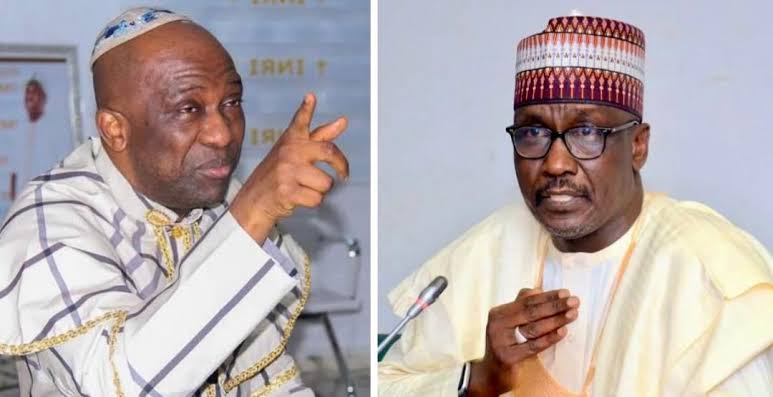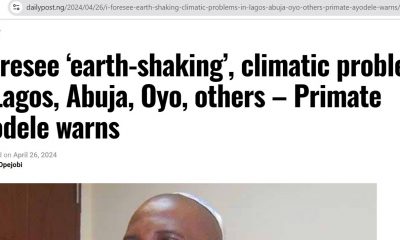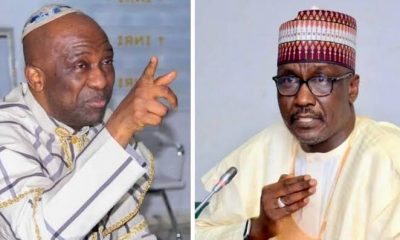Cover
Kyari, Primate Ayodele, and the unresolved petrol hassle

By Babajide Adekunle
There has been pushback from Mele Kyari, the group chief executive officer of the Nigerian National Petroleum Company Limited (NNPCL), against the calls for his sack. It is notable that several facets of Nigerian society have made the calls. I remember that in October 2023, a group of lawyers under the aegis of the ‘Coalition of Nigerian Legal Practitioners’ had asked President Bola Tinubu to relieve Kyari of his position.
The petitioners justified their request with reference to the fuel scarcity facing the country at the time. An excerpt of their petition says, “Under the current leadership of the present Group Chief Executive Officer (GCEO) of the NNPCL, the company has failed woefully and calamitously in its role to ensure adequate supply of petroleum products in the country, leading to skyrocketing transportation costs, inflation of food prices, and other untold hardships.”
In the same vein, the Christian Youth Forum of Nigeria (CYFN), in August 2024, called for Kyari’s sack, again citing fuel shortages and the astronomical increase in price of the product for their action.
The group, in a statement it issued, accused Kyari of lacking ‘empathy’ and the willingness to end the recurrent fuel shortage at filling stations, resulting in the pump price of petrol soaring to N1,000 in some places. The group described the situation as “nothing short of economic terrorism” and it believes that Kyari is complicit. In the long list of those dissatisfied with Kyari’s continued stay at the NNPCL are members of the House of Representatives, who must have found him culpable in the rift involving Dangote refinery.
The unifying thread among the incidents cited above appears to be that many Nigerians have given up on Kyari managing our shared heritage, deciding how best to use it for everyone’s advantage, and fostering the urgently required progress. Rather than Kyari proving his detractors wrong, what we have seen is an obscenely disgusting attempt to twist the issue and launch a flurry of attacks against imaginary foes. Active in this plot are spin-doctors, hired writers in the media, and different nebulous groups stumbling over one another. The emergent pro-Kyari movement has turned into a Bazaar of sorts, reminiscent of the infamous 1990s “two-million march for Abacha”.
The efforts to defend Kyari’s incompetence has become a fight between progressive and retrogressive forces, and what has so far played out is the familiar trend in which an influential person in the polity rallies support from partisan and nativist groups in opposition to popular aspirations. This is clear from the sponsored attacks in the media. In a space of three days, between August 9 and 12, two articles from fictitious writers have emerged in the Daily Trust newspapers.
In a particular hatchet job published in the newspaper, titled ‘Prophetic Missteps: Primate Elijah Ayodele’s record of unfulfilled predictions and NNPCL boss’, attributed to one Adewale Olabode, Kyari’s PR goons pilloried the clergyman for joining the patriotic call for his sack. Do Nigerians even need a seer or an oracle to tell them Kyari should go? Are we not entitled to demand for his sack, given our hardships, rising petrol prices, long queues at the filling stations, increased transportation costs, and increased food prices? I believe our focus should be on Kyari, rather than Ayodele’s prophesies that did not materialize.
Although Ayodele’s predictions have garnered him controversy, but as a citizen I find myself drawn to his compassion, altruistic and philanthropic actions toward the same oppressed people that Kyari has made unbelievably worse with his inconsistent policies as NNPCL GCEO.
Kyari’s resolve to single out Ayodele for attack is a red herring and unnecessary. Had a notable sheik from the north made a similar call, would he have sent his media attack dogs after him?
I believe Primate Ayodele, seeing the suffering of the masses, spoke out of empathy and concern, even for President Tinubu, who seemed entangled in a web of plots orchestrated to make him fail. While he makes scary prophesies at times, Ayodele will always urge his subjects to pray to avert the consequences of what he had foretold.
It is significant to note that prophets have historically been essential in influencing the path of human history, and that prophecy is an essential component of the Christian faith.
Scripture is filled with examples of prophets who foresaw disaster, only for their prophecies to be averted through restitution, divine forgiveness, or fervent prayers. The narrative of Jonah and Nineveh (Jonah 1-3) is one famous instance. Jonah had warned the Ninevites that their kingdom would be overtaken in forty days. Jonah’s prophecy caused the people of Nineveh to turn from their sins, and as a result, God spared the city.
Similarly, Amos prophesied against the kingdom of Israel, foreseeing its demise due to its wickedness (Amos 1-9). However, when the king and people of Israel heard Amos’ prophecy, they repented, delaying God’s judgment!
Nathan prophesied to David (2 Samuel 12:1-15) that he would suffer misfortune for sleeping with Uriah’s wife and producing a kid. Nathan forewarned David that the Lord would send his wives to those close to him, who would have sex with them in public. God forgave David when he admitted his sins and demonstrated contrition.
The instances provided above demonstrate that a prophecy serves as a warning, with the goal of bringing about repentance and restoration.
These illustrations demonstrate that prophecy is not a final or set result. While a priest is happy to accomplish his heavenly mission, we are ready to mock anyone who fails to fulfill a prophecy. Thus, it is foolish for Kyari’s thugs to attack Primate Ayodele.
Rather than using insulting language, Kyari need to demonstrate his ability to reverse the current negative trend and guarantee a sufficient supply of petroleum products.
Babajide Adekunle, a marketing specialist, writes from Lagos.


























